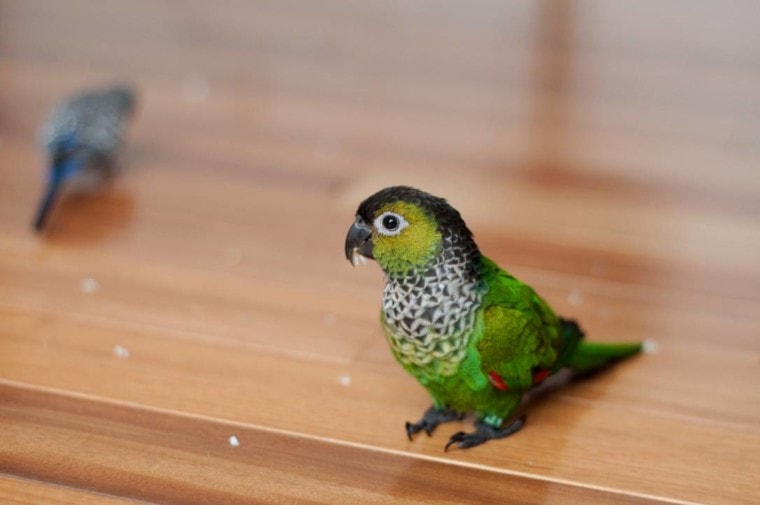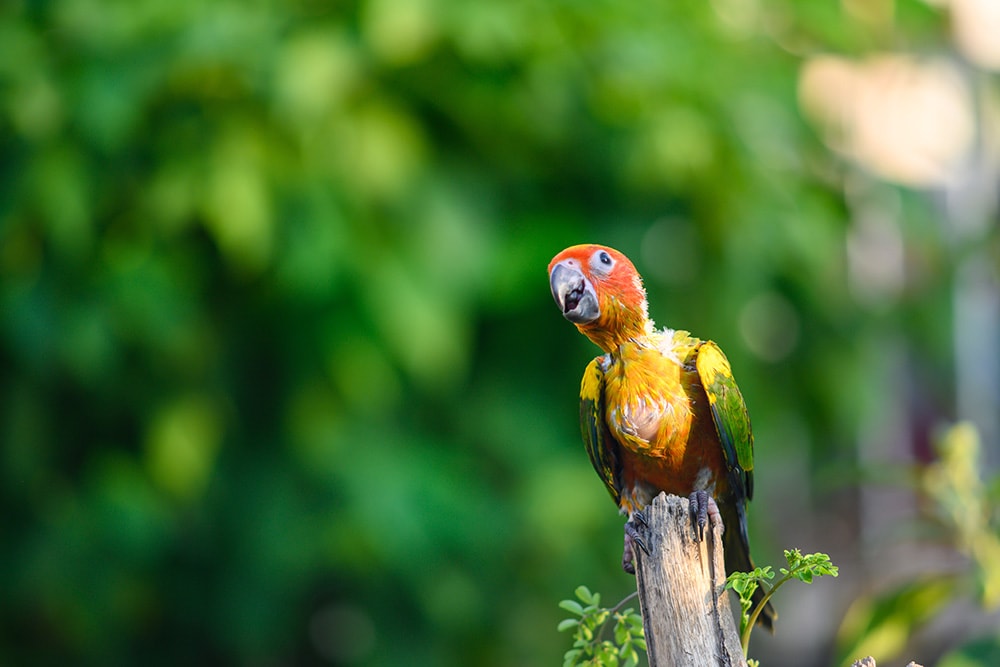
Conures are fun pets to have. If you’re thinking of raising a baby conure, you should first know a few things about these parrots to be sure it’s something you want to do. We’ve put together the following information about conures and some helpful tips to help you raise these baby parrots so yours grows up healthy and happy.
Things to Know About Conures

Raising conures can be done by first-time bird owners. However, it’s best if you have some type of experience raising birds as things will be easier if you do.
Most conures grow up to be approximately 15 inches long. These birds that are native to Central and South America can live 20 years or more. This means you need to make a big-time commitment if you’re thinking of raising a young one.
There are about 100 species of conures. Some of the most popular species people keep as pets include Sun Conures, Jenday Conures, Green-Cheeked Conures, Nanday Conures, and Blue-Crowned Conures.
Conures are personable, friendly, and playful birds. Conures are full of antics, making them very entertaining birds to raise from babies. They enjoy the company of people and need a couple of hours each day to interact with their owners.
These are vocal parrots known for their high-pitched screech. They’re also intelligent creatures that can learn to speak a few words. However, these birds are not capable of building a large vocabulary like other parrot species.
Now that you know a bit about conures, here are some tips for taking care of baby conure birds.
 The 7 Tips on How to Take Care of Baby Conure Birds
The 7 Tips on How to Take Care of Baby Conure Birds
1. Set Up a Baby Conure’s Habitat
A baby conure should be sufficiently weaned by the time it becomes 12 weeks old. This is the age when many breeders sell babies and when a baby conure can live independently in a cage.
A conure should be kept in a cage that’s big enough for the bird to climb, play, and stretch its wings. At the very least, use a cage that’s 20” W x 20” D x 30” H. It’s best to go with the biggest cage you can provide.
There should be two or three perches inside a conure cage that are of different thicknesses and materials. Be sure to place the perches at different heights to give your conure some changes of scenery. It’s important not to place the perches over your bird’s food or water dishes. This is important because bird droppings are messy.
The cage should be placed in a quiet room out of direct sunlight. Keep it out of cold drafts, too, and away from smoke, gases, and strong odors. It’s best to line the floor of the cage with a paper liner. Alternatively, you can use some birdcage bedding. To ensure your conure gets enough sleep, put a cage cover on the cage at night.

2. Feed Your Baby Conure Nutritious Food
A baby conure that’s at least 12 weeks of age should be done with hand-feeding. By this age, the baby can eat food on its own. When you put your baby bird in a cage with some toys and see that the bird is picking things up, you can be sure that the baby can eat pellets and other conure food without any problem whatsoever.
The diet of a baby conure that’s at least 12 weeks old should consist of the same conure food for adults. Conures enjoy a varied diet and can be fed many fruits like bananas, mangos, papaya, kiwis, peaches, figs, oranges, and nectarines. When feeding fruit to a baby conure, only give the bird small pieces and don’t leave fruit in the food dish to rot.
3. Maintain a Proper Temperature
While conures can tolerate a wide range of temperatures, it’s best to keep the temperature between 65°F – 85°F. Never let the temperature drop below 40°F as it can pose a danger to your bird.
If you can’t avoid keeping your conure in higher temperatures, be sure there is plenty of air circulation. To make sure your conure keeps warm during the winter months, keep the cage away from drafty windows.

4. Provide Your Bird with Toys
Since conures are playful birds, it’s important to give them some toys to play with. It’s a good idea to have a variety of toys so your young conure doesn’t get bored. When these birds don’t have enough to do, they’re prone to feather plucking, so pick up a few bird toys you can switch often to keep your bird occupied.
- Related Read: 10 Best Toys for Conure Birds
5. Form a Bond with Your Baby Conure
To develop a strong bond with your young conure keep your voice quiet and upbeat. Don’t make any sudden movements that can startle your little feathered friend. By talking softly, socializing, cuddling, and playing, you’ll be able to form a strong life-long bond with your conure.
When your young bird is bonded with you, he will display an obvious desire to interact with you. He will willingly step out of his cage and onto your arm. If the bird has been socialized around other family members, he will show some interest in these people as well. Your bird will become part of the family and will be happy to spend time outside his cage with you.
6. Regularly Clean Your Conure’s Cage
To successfully raise a healthy and happy conure, you have to keep his cage clean. The easiest way to do that is to clean the cage every couple of days.
Cleaning a conure cage is easy. First remove the bird and place it in another cage. Then remove the tray liner or bedding and all toys. Then use warm soapy water and a sponge or rag to wipe down all the surfaces of the cage. Clean the perches and toys you removed from the cage the same way.
Then use warm water and a cloth or sponge to rinse away all of the soap. When the cage is clean, put a new liner or fresh bedding in the cage along with the perches and toys, then place your bird back inside.
7. Assist Your Baby Conure with Grooming
A conure doesn’t need much grooming other than keeping its nails trimmed. When your bird’s nails become sharp or uncomfortable to handle, it’s time to trim them.
A conure should be allowed to bathe often. Some conures enjoy splashing around in a bathtub and others like the shower or faucet. There are even some that enjoy being misted down with a spray bottle or splashing around in a shallow dish of water. To find out how your young conure prefers bathing, give the bird plenty of access to water. Sooner or later, you’ll figure it out!
Conclusion
Now that you know what it takes to care for a baby conure, it’s time to start making some plans. Before you rush out to buy a baby bird, be sure you’ve got everything ready so your cute little conure will feel right at home. Before long, you’ll discover that it’s great fun to raise a conure and a rewarding thing to experience!
You may also want to read:
- What’s the Optimum Age to Bring a Conure Home?
- Cockatiel vs Conure: Which Pet Bird is Better? (With Pictures)
Feature Image Credit: UniqSnaps, Shutterstock


 The 7 Tips on How to Take Care of Baby Conure Birds
The 7 Tips on How to Take Care of Baby Conure Birds





